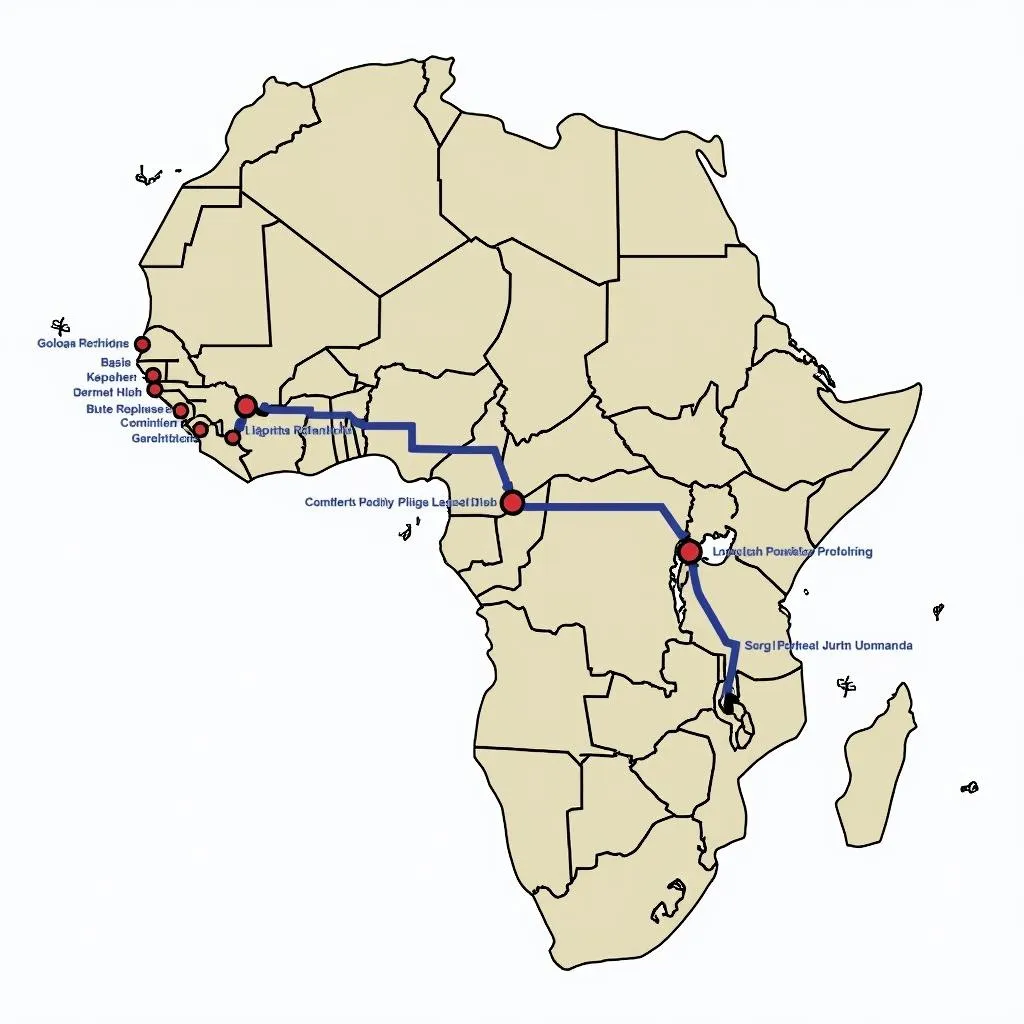African FTA Comes into Effect: A New Era for the Continent
The African Continental Free Trade Area (AfCFTA) agreement, hailed as a game-changer for Africa’s economic integration, officially came into effect on January 1, 2021. This landmark agreement paves the way for a single continental market for goods and services, with the potential to unlock significant economic growth and development across the continent.
The Promise of Free Trade: Unlocking Africa’s Economic Potential
The AfCFTA aims to create a single market of 1.3 billion people with a combined GDP of over US$3.4 trillion. By eliminating tariffs and reducing non-tariff barriers, the agreement aims to boost intra-African trade, currently significantly lower than other regions.
Key Objectives of the African Continental Free Trade Agreement Visionias:
- Increased Trade: The AfCFTA aims to increase intra-African trade by at least 52% by reducing tariffs and removing non-tariff barriers.
- Economic Diversification: By promoting trade in a wider range of goods and services, the agreement encourages African countries to move beyond dependence on primary commodities.
- Industrialization and Value Addition: The AfCFTA seeks to promote industrial development and value addition within Africa, creating jobs and boosting economic growth.
- Improved Competitiveness: A larger, integrated market allows African businesses to achieve economies of scale, making them more competitive globally.
 African Business Growth
African Business Growth
Addressing Challenges: From Implementation to Infrastructure
While the potential benefits of the AfCFTA are enormous, realizing this vision requires addressing key challenges:
Infrastructure Development:
Efficient transportation, energy, and communication infrastructure are crucial for facilitating trade. Addressing infrastructure gaps is essential for the AfCFTA’s success, requiring significant investment and regional cooperation.
Non-Tariff Barriers:
Beyond tariffs, non-tariff barriers such as cumbersome customs procedures, bureaucratic delays, and varying standards hinder trade. Streamlining these processes is essential for seamless trade facilitation.
Capacity Building:
Many African businesses, particularly SMEs, need support to take advantage of new market opportunities. Building capacity in areas like trade finance, logistics, and quality standards is crucial.
 African Trade Routes and Logistics
African Trade Routes and Logistics
Beyond Trade: Deepening Integration for Sustainable Development
The AfCFTA goes beyond trade liberalization, aiming to foster deeper regional integration and sustainable development across Africa.
Movement of People:
Facilitating the movement of skilled professionals and labor across borders can contribute to knowledge transfer, technology adoption, and economic growth.
Investment Promotion:
The AfCFTA seeks to create a more attractive investment climate, encouraging both domestic and foreign investment in key sectors.
Regional Value Chains:
The agreement encourages the development of regional value chains, enabling African countries to participate more effectively in global trade.
“The AfCFTA is not just about trade; it’s about transforming the African economy,” says Dr. Amina Ibrahim, a prominent economist specializing in African trade. “It’s about creating jobs, fostering innovation, and improving the lives of millions of Africans.”
A Long Road Ahead: Collaboration and Commitment for Shared Prosperity
The African Continental Free Trade Area is a journey, not a destination. Full implementation will take time, requiring sustained commitment, collaboration, and political will from all stakeholders.
The Role of the African Development Bank Objectives:
The African Development Bank (AfDB) plays a vital role in supporting the AfCFTA’s implementation through:
- Financial Assistance: Providing concessional loans and grants for infrastructure development, trade facilitation, and capacity building initiatives.
- Technical Expertise: Offering technical assistance to member countries in areas like trade policy, customs modernization, and investment promotion.
- Policy Advocacy: Advocating for policies that promote regional integration, investment, and private sector development.
Conclusion: A Brighter Future for Africa
The African Continental Free Trade Area (AfCFTA) marks a pivotal moment in Africa’s history, ushering in a new era of economic integration and development. While challenges remain, the potential benefits are immense. By working together, African countries can harness the power of the AfCFTA to create a more prosperous and integrated continent.
FAQ
1. What is the African Continental Free Trade Area (AfCFTA)?
The AfCFTA is a trade agreement between 54 African Union member states, creating a single market for goods and services. It aims to boost intra-African trade, promote economic diversification, and foster industrial development.
2. When did the AfCFTA come into effect?
The AfCFTA agreement officially entered into force on January 1, 2021.
3. What are the key objectives of the AfCFTA?
The AfCFTA aims to increase intra-African trade, promote industrial development, create jobs, boost economic growth, and improve Africa’s global competitiveness.
4. What are some of the challenges facing the AfCFTA?
Key challenges include infrastructure gaps, non-tariff barriers, and the need for capacity building, particularly for SMEs.
5. How can I learn more about the African Continental Free Trade Area (AfCFTA) IAS Parliament?
For a deeper understanding, you can find valuable resources on the African Continental Free Trade Area (AfCFTA) IAS Parliament.
6. What is the role of the African Development Bank in supporting the AfCFTA?
The AfDB plays a crucial role in providing financial assistance, technical expertise, and policy advocacy to support the AfCFTA’s implementation.
7. What is the significance of the AfCFTA for Africa’s future?
The AfCFTA has the potential to transform the African economy, create jobs, foster innovation, and improve the lives of millions of Africans by promoting economic integration, trade, and development.
Need Support?
Contact us at:
Phone: +255768904061
Email: [email protected]
Address: Mbarali DC Mawindi, Kangaga, Tanzania.
Our customer service team is available 24/7 to assist you.


